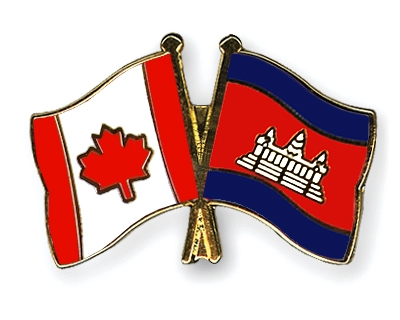Canada’s soaring trade with Cambodia cheapens our talk of human rights protection
Op-Ed: The Star
Business Columnist Tues., Feb. 12, 2019
Have the stores filled up yet with gauzy T-shirts in spring colours?
It’s so hard to see through all this snow.
/https://www.thestar.com/content/dam/thestar/business/opinion/2019/02/12/canadas-soaring-trade-with-cambodia-cheapens-our-talk-of-human-rights-protection/hun_sen.jpg)
When visibility resumes, it will be time, again, to check your clothing labels.
The decision taken this week by the European Commission to launch an investigation into what it calls evidence of “serious and systemic violations of core human rights and labour rights in Cambodia” caused barely a ripple in this part of the world. And yet even the threat of suspension of preferential trade access to the EU — the penalty Cambodia will pay if found to be deficient in upholding such core principles as the right to freedom of assembly — should reawaken interest in our own trade relations with Cambodia.
In 2002, Canada imported $20.9 million worth of goods from the country, the vast majority of which were clothing imports.
By 2017, the last full year for which numbers are available, that figure had rocketed to $1.3 billion. Again, apparel accounts for almost all imports. Jeans. T’s. Knitwear. Footwear.
You may not be aware, but you should be.
Cambodia was granted preferential access to the EU market under the Everything But Arms trade scheme, established in the fall of 2012 to foster sustainable social, economic and environmental development in least-developed countries as defined by the UN. The trade arrangement grants duty-free and quota-free access for all goods, with the exception of arms and ammunition. In the case of the EU, 99 per cent of exported goods were eligible, so the economic appeal is clear. But at what cost?

As the EU’s high representative for foreign affairs states, Cambodia is witnessing a “deterioration of democracy, respect for human rights and the rule of law.”
Last July, prime minister and former Khmer Rouge commander Hun Sen was re-elected in what was roundly condemned as a mockery of democracy. The leader of the opposition party, Kem Sokha, had been arrested on charges of treason and the country’s Supreme Court had ordered the dissolution of the Cambodia National Rescue Party.
Global Affairs Canada issued a note that it was “troubled” by the course of events, and that Hun Sen and his Cambodian People’s Party retained power only after a campaign “widely recognized to have been marred by voter intimidation and manipulation of the polls.” Canada called on the Cambodian government to allow “basic civil rights for the people of Cambodia, reinstate freedom of expression and political participation and release opposition leader Kem Sokha, who has been in jail for almost 11 months without bail.”
But where’s the stick?
Sokha was “released” last September and has yet to go on trial, with the government referring to his ongoing house arrest as “court supervision.”
The dilemma here is clear: how to advance the rights of the people on the ground in Cambodia without economically punishing them by withdrawing preferential trade access?
Canada granted similar access to Everything But Arms under its Market Access Initiative, which was designed to encourage foreign development through trade, exclusive of certain supply-managed dairy products.
It worked, as the export numbers attest.
The garment industry is by far Cambodia’s largest employer, with more than 700,000 workers. Industry representatives have been voicing their concerns for months that the EU might make good on its threat to formally launch a review that could result in the suspension of trade advantages.
The review launched Monday does not mean the immediate removal of trade preferences. What it does do is trigger a six-month period of what the European Commission calls “intensive monitoring and engagement.” That engagement will examine human rights and labour rights, including the rights of political participation, and the freedoms of assembly, expression and association. A final decision will be taken in 12 months.
So that’s the stick.
Where’s ours?
Continue reading